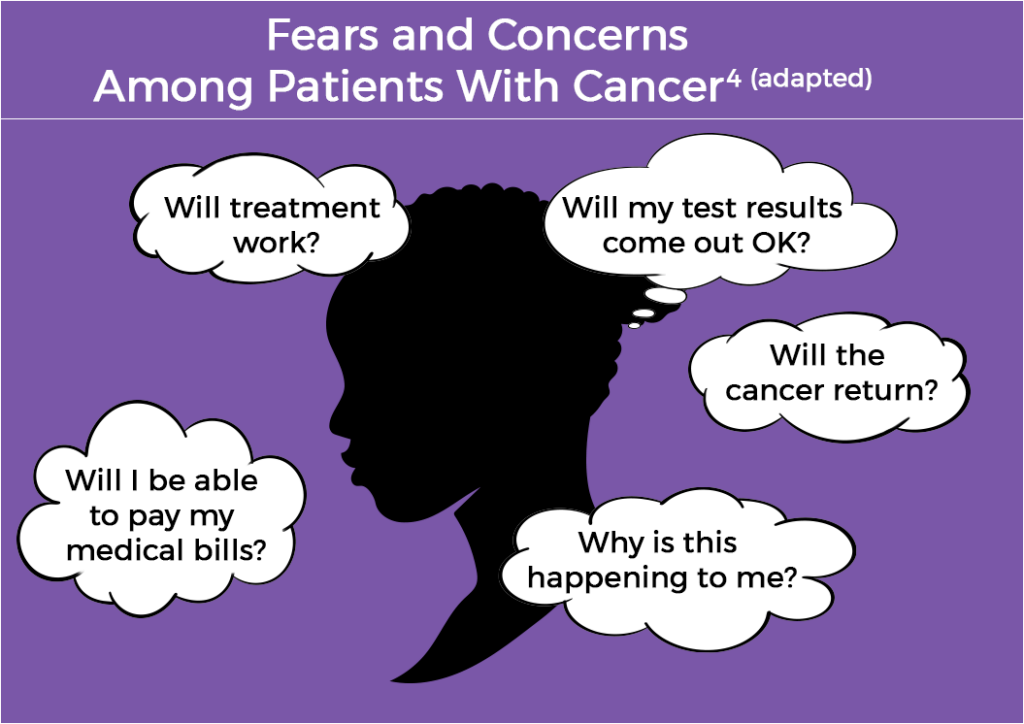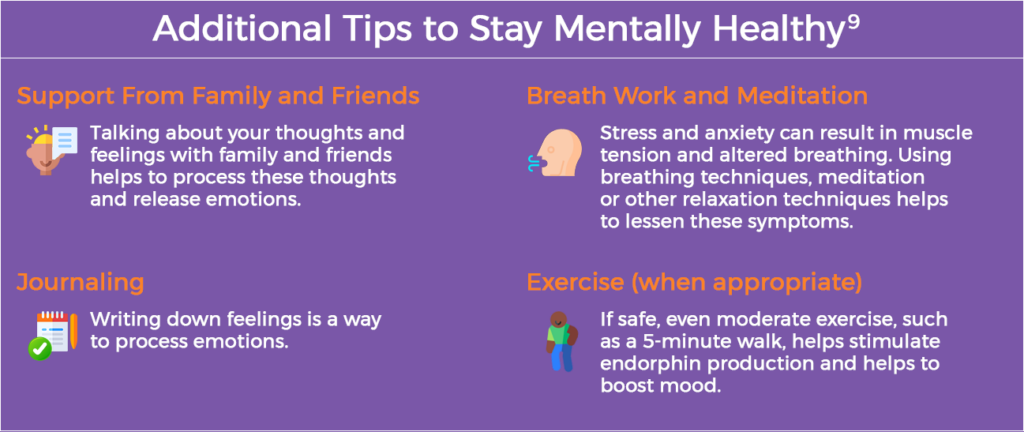This activity is provided by Med Learning Group.
This activity is supported by an independent medical education grant from Regeneron Pharmaceuticals, Inc.
Copyright © 2024 Med Learning Group. Built by Divigner. All Rights Reserved.
Staying Mentally Healthy
Staying Mentally Healthy
Cancer affects not only physical health but mental health as well.1,2 Anxiety, depression and stress are common throughout the cancer experience, including screening, awaiting test results, diagnosis, treatment and worrying if the cancer will return.1,2 Feelings of worry, fear, hopelessness and/or feeling overwhelmed can affect life at home, school, and work.1 It is important to know that these feelings are common, but should be promptly evaluated and treated by a health care professional.1
Anxiety and Depression Among Patients
On average, one-third of patients with cancer experience a psychiatric or neuropsychiatric disorder.1 The degree of symptoms can vary greatly depending upon the cancer type, stage and expected outcomes.1 Anxiety and depression may be accompanied by sleeplessness and feeling more pain than usual from cancer treatments, which could lead to delays in cancer treatment and/or missing follow-up appointments.3
The COVID-19 pandemic heightened anxiety and depression for many individuals, but even more so for patients with cancer.5 The immune system is weakened by cancer treatments, therefore increasing the risk for severe illness and even death from COVID-19.5 Moreover, the forced closures of health care facilities affected follow-up screenings and cancer treatments.7 In addition, clinical trials were halted, preventing access to new, potentially life-saving treatments.7 While many aspects of cancer care impacted by the COVID-19 pandemic have returned to pre-pandemic levels, the consequences for patients with cancer is not yet fully known.7
Addressing Mental Health Concerns
It is important to mention any feelings of anxiety, depression and stress with a member of the cancer care team.6 In fact, mental health screening has become a part of standard cancer care across most cancer institutions and facilitites.8 One-on-one and group counseling that focuses on thoughts, feelings and behaviors are often recommended for patients with cancer and can be beneficial.8 Medication may also be prescribed, in addition to other non-medication strategies to help boost mental health.8,9
References
- Caruso R, Breitbart W. Mental health care in oncology. Contemporary perspective on the psychosocial burden of cancer and evidence-based interventions. Epidemiol Psychiatr Sci. 2020;29:e86.
- American Cancer Society. Emotional, Mental Health, and Mood Changes. https://www.cancer.org/treatment/treatments-and-side-effects/physical-side-effects/emotional-mood-changes.html
- National Cancer Institute. Adjustment to Cancer: Anxiety and Distress (PDQ®) — Patient Version. Updated September 21, 2022. https://www.cancer.gov/about-cancer/coping/feelings/anxiety-distress-pdq
- Georgetown University School of Nursing. Managing Mental Health After Cancer Diagnosis. October 14, 2021. https://online.nursing.georgetown.edu/blog/cancer-mental-health/
- National Cancer Institute. Helping Cancer Survivors Cope with Cancer-Related Anxiety and Distress. April 30, 2020. https://www.cancer.gov/news-events/cancer-currents-blog/2020/cancer-survivors-managing-anxiety-distress
- Wang YH, Li JQ, Shi JF, et al. Depression and anxiety in relation to cancer incidence and mortality: a systematic review and meta-analysis of cohort studies. Mol Psychiatry. 2020;25(7):1487-1499.
- American Association for Cancer Research. AACR COVID-19 and Cancer Report. Cancer in the Midst of COVID-19 and Beyond. https://cancerprogressreport.aacr.org/covid/c19c-contents/c19c-cancer-in-the-midst-of-covid-19-and-beyond/
- Donovan KA, Grassi L, Deshields TL, Corbett C, Riba MB. Advancing the science of distress screening and management in cancer care. Epidemiol Psychiatr Sci. 2020;29:e85.
- Dana-Farber Cancer Institute. 10 Tips for Managing Cancer-Related Stress and Anxiety. Updated: October 10, 2019. https://blog.dana-farber.org/insight/2018/05/10-tips-manage-cancer-related-stress-anxiety/
- Nakamura ZM, Damone EM, Herrick HP, Nyrop KA, Deal AM, Brenizer AT, Muss HB. Anticipating mental health needs after chemotherapy in early-stage breast cancer using patient-reported symptom screening. Support Care Cancer.2022. https://link.springer.com/article/10.1007/s00520-022-06827-8



